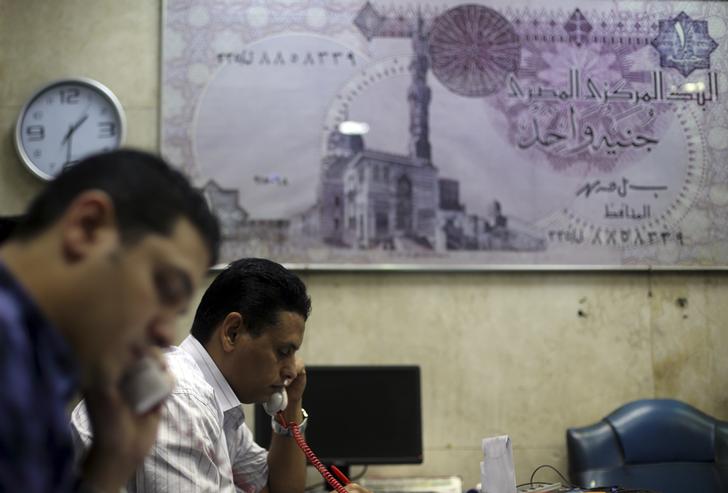In an unexpected move, the Central Bank of Egypt (CBE) revalued the Egyptian pound against the dollar, raising it by 20 piasters, after multiple devaluations which until yesterday had taken the currency’s decline to the year to 11 percent.
The pound is now changing hands at its price in early October, 7.73 to the dollar. It was devalued twice in mid-October to hit 7.93 against the dollar. At the time, analysts told Aswat Masriya they expected the pound to be changing hands at 8.20, and even 8.25 against the dollar by yearend.
Observers say the revaluing aims to “confuse” currency manipulators – those who trade on the black or parallel market – but it has sparked questions of how the CBE is funding such moves given Egypt’s limited hard currency reserves.
The cash-strapped Egyptian government is suffering from a serious dollar shortage and has been devaluing the pound throughout the year, as observers say the government can no longer sustain the high cost of supporting the pound against the dollar.
The Financial Times said in October that the pound is the “most overvalued currency with a current account deficit in emerging markets.”
Years of political turmoil have taken a toll on Egypt’s economy, halving the state’s foreign reserves and driving away tourists. The Russian plane crash in the Sinai desert on Oct. 31 signals an even more grim outlook for the tourism sector, which the state has been hard at reviving, and is likely to curb cash inflows.
But the revaluation today may not signal an upward trend for the pound.
A banking expert, who preferred to remain anonymous, said the CBE is “pressuring manipulators,” but it must have “real support” in terms of resources. He said that when such measures were taken by previous governments, they were usually followed by “significant devaluations”.
The CBE has spent much of this year fighting the black market, which has recently reemerged after the measures taken to curb it restricted the access of manufacturers to hard currency.
Since December 2014, the CBE has been holding three weekly foreign exchange auctions, on Sunday, Tuesday and Thursday, which makes today’s auction an “exceptional” one.
Hany Genena, the head of research at investment bank Pharos said that it appears that the CBE is creating the impression that the value of the currency is not moving in one direction, “in the framework of creating a new system that allows the free trade of the local currency.”
The CBE has not announced how many dollars it put up for auction today but the state news agency MENA said the purpose of this auction was to supply 25 percent of the dollars needed to fund imports.
The auction today comes just days after the Federation of Egyptian Industries (FEI) said it was promised by the CBE’s newly appointed governor Tarek Amer, who has yet to assume office, that $4 billion will be pumped into the federation to allow it to provide hard currency for previous import contracts.
The chairman of FEI Mohamed al-Sewedy said Amer promised to provide the $4 billion within two weeks, without stating the source of the money.
Egyptian President Abdel Fattah al-Sisi appointed Amer as the new governor of the CBE on Oct. 21, after an abrupt resignation announcement by then-governor Hesham Ramez. When Ramez took office in February 2013, the Egyptian pound was changing hands at 6.5 pounds to the dollar.
Swedey added in statements on Monday that the CBE has supplied banks with $1.8 billion in the past few days to support the needs of importers.
The money promised to FEI will be used to pay for import contracts dating back to February, when the CBE put a cap on the dollar deposits, $10,000 a day and $50,000 a month. This was part of the CBE’s quest to fight the black market.
The pound started off 2015 changing hands at 7.14 against the dollar. Its devaluations throughout the year brought it closer to its real value and analysts expected the CBE to continue to do so, to attract foreign investors and to support exports.
Both the International Monetary Fund (IMF) and the World Bank have advised Egypt to adopt such a “flexible” policy, in light of the domestic and international economic slowdown.
This comes at a time when Egypt’s foreign reserves are extremely low, covering only three months of imports, which is the IMF’s recommendation, but some estimates suggest that the reserves will last even less than three months.
Foreign reserves have dropped for three months in a row, reaching $16.335 billion at the end of September and prompting credit ratings provider Moody’s to say on Oct. 12 that these subsequent declines are “credit negative” for the country.
“The drop reflects continued dependence of Egypt’s balance of payments on external donor support, which is credit negative for the country’s external liquidity position,” Moody’s said at the time.
By the end of October, reserves inched up by $80 million, climbing to $16.415 billion, which is still less than half of the reserves before the 2011 uprising, when they stood at almost $36 billion.







Comment (1)
[…] Egypt Raises the Pound by 0.20, Brings it Back to 7.73 Against Dollar – Years of political turmoil have taken a toll on Egypt’s economy, halving the state’s foreign reserves and driving away tourists. The Russian plane crash in the Sinai desert on Oct. 31 signals an even more grim outlook … […]